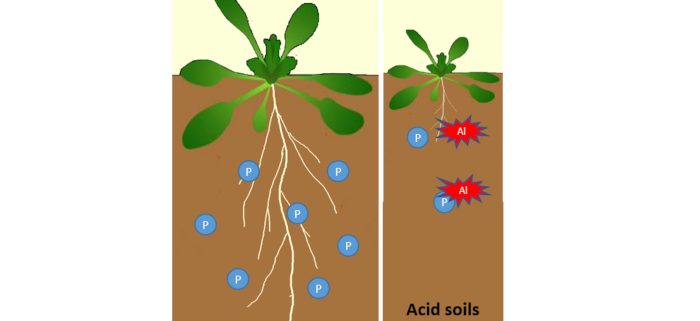Aluminum Toxicity and Phosphate Deficiency: One Compound to Rule Them All
Wei et al. explore how aluminum toxicity and inorganic phosphate limitation inhibit plant growth.
Pengliang Weia,b and Lieven De Veyldera,b
aDepartment of Plant Biotechnology and Bioinformatics, Ghent University, Ghent, B-9052, Belgium
bCenter for Plant Systems Biology, VIB, Ghent, B-9052, Belgium
Background: Acid soils are one of the most significant problems for worldwide crop production, as up to 50% of the world’s arable land is acidic. Aluminum (Al) toxicity and inorganic phosphate (Pi) limitation are two major interconnected problems in acid soils, potentially triggering a strong inhibition of root growth, stem cell loss, nutritional deficiency and an overall reduction in plant yield. The problem is further aggravated by farming practices and industrial pollution. As Al toxicity and Pi deficiency raise the risk of food insecurity, it is important to understand the molecular mechanisms by which they affect growth.
Question: To pinpoint new molecular components that result in the problem of stem cell loss, we used a small compound screen to identify chemicals that help to overcome meristem loss of Arabidopsis plants grown under Al toxic conditions.
Findings: We identified a drug that is structurally related a casein kinase 2 (CK2) inhibitor and subsequently demonstrated that CK2 activity accounts for root growth inhibition under Al toxic conditions. Subsequently, we found that CK2 acts through direct or indirect phosphorylation of the cell cycle checkpoint activator SUPPRESSOR OF GAMMA RADIATION1 (SOG1), priming its activity under DNA-damaging conditions. In addition to yielding Al tolerance, CK2 and SOG1 inactivation prevented meristem loss under Pi starvation, revealing the existence of a low Pi-induced cell cycle checkpoint that depends on the DNA damage activator ATAXIA TELANGIECTASIA MUTATED. Overall, our data reveal a potential important physiological role for the plant DNA damage response pathway under agriculturally limiting growth conditions, opening new avenues to cope with the problem of Pi limitation.
Next steps: As both CK2 and SOG1 inhibition prevent Arabidopsis root stem cell loss under Al toxic and Pi limiting conditions, it will be important to test whether the same mutations help crops deal with the problems linked to acid soils. Additionally, it will be important to know how CK2 and SOG1 contribute to meristem loss by identifying their downstream target genes. Another important aspect is understanding how CK2 controls SOG1 activity, a question that might be solved by studying SOG1 at the structural level.
Pengliang Wei, Manon Demulder, Pascale David, Thomas Eekhout, Kaoru Okamoto Yoshiyama, Long Nguyen, Ilse Vercauteren, Dominique Eeckhout, Margot Galle, Geert De Jaeger, Paul Larsen, Dominique Audenaert, Thierry Desnos, Laurent Nussaume, Remy Loris, and Lieven De Veylder. (2021). Arabidopsis casein kinase 2 triggers stem cell exhaustion under Al toxicity and phosphate deficiency through activating the DNA damage response. Plant Cell.




